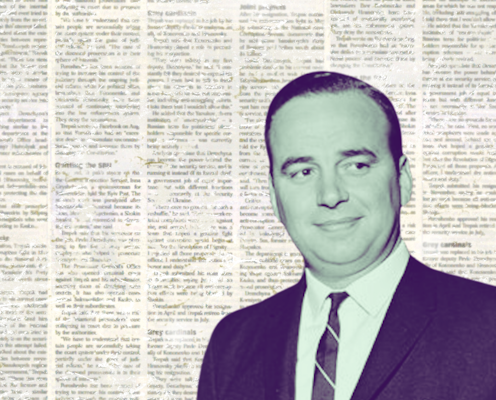From the earliest years of his career, the young Rupert Murdoch ruthlessly pursued his interests
- Written by Rodney Tiffen, Emeritus Professor, Department of Government and International Relations, University of Sydney

Nearly every biographical commentary on Rupert Murdoch notes how he began with a modest inheritance in Adelaide, principally an afternoon newspaper, and built it into a global multimedia empire. Walter Marsh’s book Young Rupert: The Making of the Murdoch Empire[1] has the distinctive strength of knowing Adelaide much better than any other Murdoch watcher, and studying Murdoch’s Adelaide period in more depth than anyone else.
Review: Young Rupert: The Making of the Murdoch Empire – Walter Marsh (Scribe)
Rupert’s father, Sir Keith Murdoch, was the most famous Australian newspaperman of his generation. As the dominant figure in the Herald & Weekly Times group for over two decades, he built the country’s first newspaper empire.
But he increasingly resented the chasm between being a shareholder and an employee, no matter how well rewarded. He was determined to leave his son Rupert a tangible inheritance. In the last years of his life, he sought to build his own independent newspaper empire in ways that were far from being in the best interests of the Herald & Weekly Times.
Sally Young’s recently published Paper Emperors: The Rise of Australia’s Newspaper Empires[2] gives a very good account of Keith’s machinations. Rupert would never have allowed any employee of his to behave in the way Keith did.
A great fight
After all Keith’s efforts, once the personal debts and death duties were paid, Rupert’s inheritance essentially came down to the Adelaide News. Editing the Adelaide News was Rohan Rivett, Keith’s trusted confidante and Rupert’s mentor and friend from his Oxford days.
Rivett was a distinguished journalist, who had recorded his experiences as a prisoner of war in Behind Bamboo[3], the bestselling Australian book on World War II. His political leanings were to the left. The Adelaide News was seen as bringing a refreshing degree of social and political liberalism to South Australia’s stuffy politics, although the paper rarely directly challenged the premier, Sir Thomas Playford, by far the longest reigning state premier in Australian history (1938-1965).
Almost immediately, the Herald & Weekly Times morning newspaper – the very establishment Advertiser – sought to drive News Limited out of business by starting a rival Sunday newspaper. Rivett and Rupert fought hard to survive. Not for the last time, Rupert relished the conflict. “It is going to be a great fight,” he told Rivett.
In a front page editorial, Murdoch and Rivett disclosed the behind the scenes actions of their rivals. After a couple of years, the two Sundays fought each other to a stalemate. In the subsequent agreement, in some ways News emerged the better. Rivett and Murdoch had won their first big challenge.
With this threat disposed of, Murdoch, now with the title “publisher”, began his expansion. He bought the Sunday Times in Perth, where free from Rivett’s presence he was more able to indulge his tabloid tastes.
He also successfully applied to get one of the first two commercial television licences in Adelaide, although his lobbying to make this a commercial monopoly service failed.
Marsh deftly documents how Murdoch’s views on the virtues of monopoly and competition varied to suit his immediate interests. Murdoch’s declaration, when he unsuccessfully applied for the first commercial television service in Perth, that he was not interested in building his empire, has not exactly stood the test of time.
Read more: A reciprocating engine of money, power and influence: how Australia's 'media monsters' used journalism to cement their empires[4]
Two episodes
The two episodes that later writers always mention about Murdoch’s Adelaide period are the News’ championing of the cause of Rupert Max Stuart, convicted for the rape and murder of a nine-year-old girl, and his firing of Rivett.
Stuart was an itinerant Aboriginal labourer, illiterate, with limited English and prone to alcoholic binges. In December 1958, he was arrested near Ceduna and charged with the murder. The case for conviction rested principally on his confession.
With the threat of imminent execution hanging over him, Stuart had his cause taken up by Father Tom Dixon. A pamphlet by the historian Ken Inglis and coverage in the Adelaide News, driven by Rivett and supported by Murdoch, forced a new trial and then a Royal Commission.
The newspaper’s coverage of the Stuart case became politically controversial and the Playford government brought nine charges against it, including seditious libel. After a prolonged period of suspense, these charges were dismissed.

















